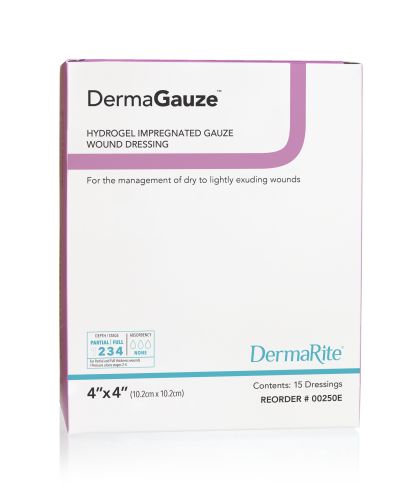Hydrogels: Impregnated
Impregnated hydrogel wound dressings are gauzes and non-woven sponges, ropes, and strips saturated with an amorphous hydrogel. Amorphous hydrogels are formulations of water, polymers and other ingredients with no shape, designed to donate moisture to a dry wound and to maintain a moist healing environment. The high moisture content serves to rehydrate wound tissue. Indicated for partial- and full-thickness wounds, wounds with necrosis and deep wounds with tunneling or sinus tracts. Available in a wide variety of sizes.
Impregnated hydrogel wound dressings are gauzes and non-woven sponges, ropes and strips saturated with an amorphous hydrogel. Amorphous hydrogels are glycerin- and water-based products primarily manufactured for the purpose of wound hydration. These dressings help maintain a moist wound healing environment, promote granulation and epithelialization, and facilitate autolytic debridement. Because of the high water content of hydrogels, they typically cannot absorb large amounts of exudate. Hydrogel dressings are also available in sheet form.
Impregnated hydrogel dressings feature the following general performance properties and attributes:
• Cooling action soothes and reduces pain
• Nonadherent
• Rehydrate the wound bed
• Fill in dead space
• Easy application and removal
• Can be used on infected wounds
• Facilitate autolytic debridement
• Atraumatic removal
• Can be used with topical medications
Impregnated hydrogels are indicated for use as a primary dressing in the treatment of minimally draining partial- and full-thickness wounds such as stage II-IV pressure ulcers, deep wounds, minor burns, infected wounds, dermal ulcers, skin tears, donor sites, radiation dermatitis and wounds with necrosis or slough.
Impregnated hydrogel dressings are contraindicated for use on wounds with heavy exudate.
The following general warnings apply to impregnated hydrogel dressings. Always refer to manufacturer information for Warnings and Precautions for a specific product.
May dehydrate if left uncovered.
May cause maceration of periwound skin.
Not recommended for use on wounds with moderate to heavy exudate.
May require daily dressing changes.
Products
Pagination
Have a product to submit?
Be included in the most comprehensive wound care products directory
and online database.
Learn More















